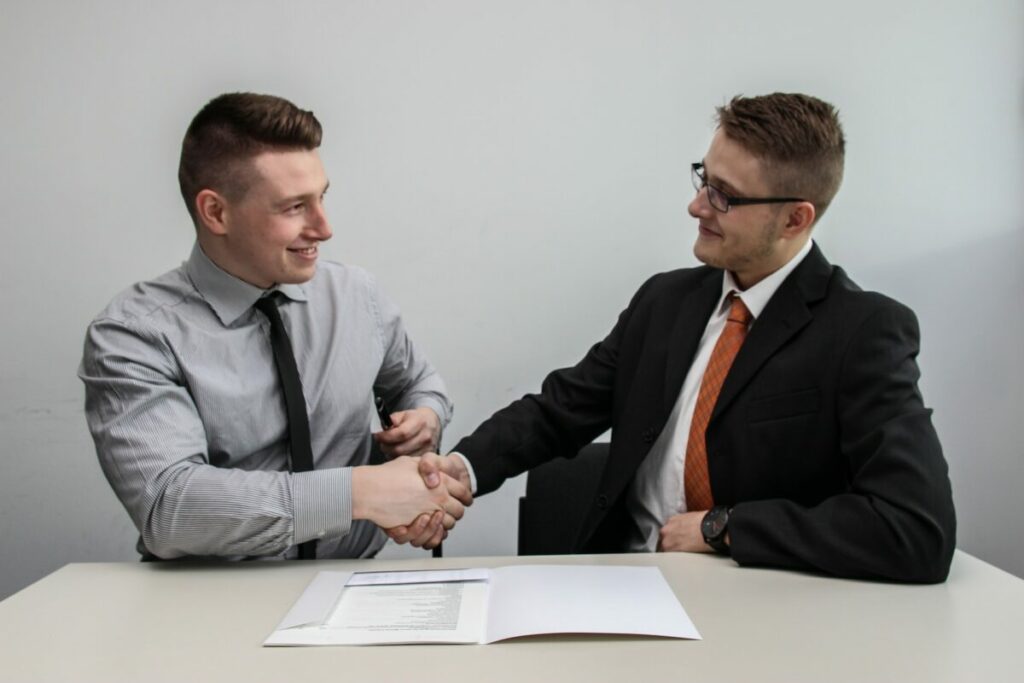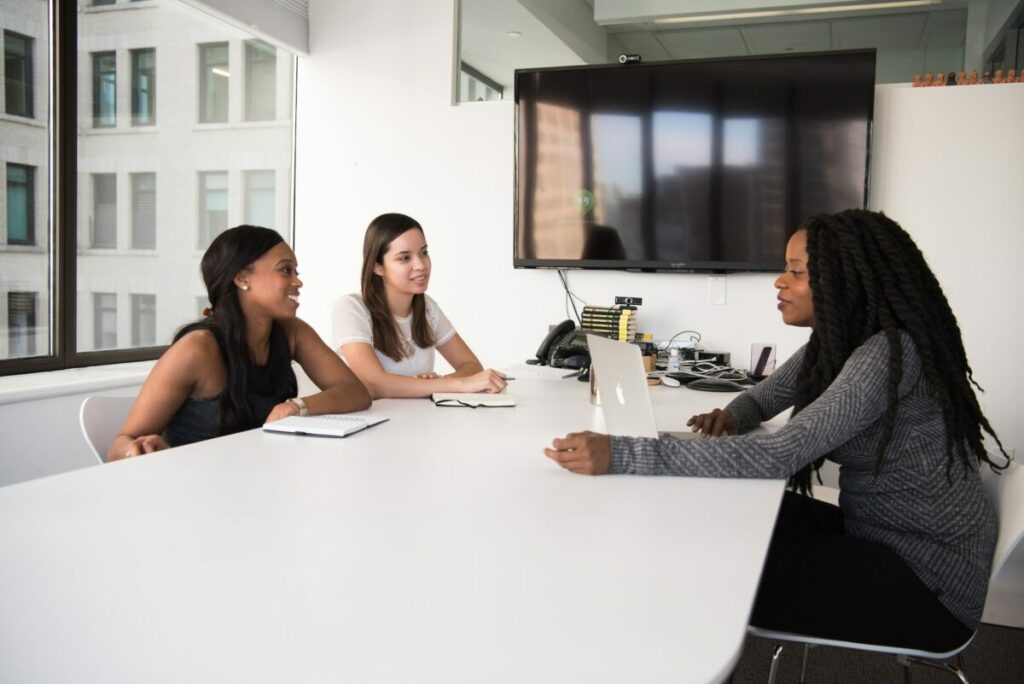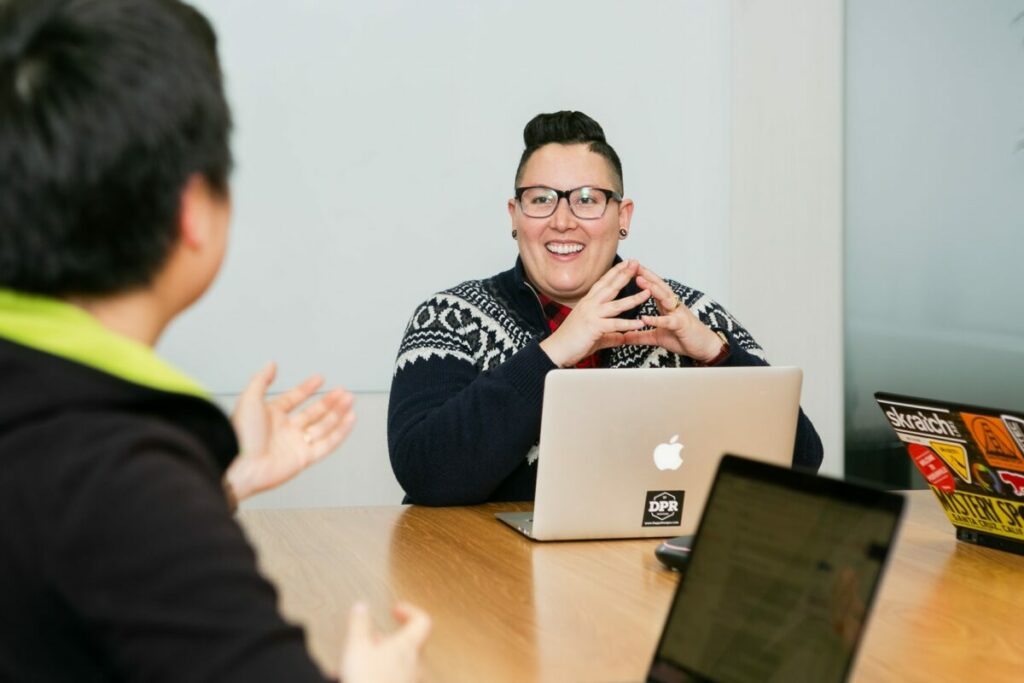Embarking on the interview process is a dual-faceted venture, pivotal for recruiters seeking the ideal addition to their current company and for candidates aspiring to secure their desired role. This article serves as a dual-purpose compass, charting the course through the most common interview questions. It provides tailored interview advice, equipping both interviewers and interviewees with insightful sample answers and a deep dive into the rationale behind each question.
Recruiters will discover how to craft a job ad that captures all the skills necessary to identify the perfect candidate, while candidates will learn to decode the job advert, ensuring their approach aligns with what the right person for the role looks like. With strategic tips on highlighting work style and fit, this guide aims to refine the interview process, making it an effective and rewarding experience for both parties involved. Join us as we bridge the gap between asking and answering, shaping the path to successful hiring and career success.
Quick Links:
- For Hiring Managers – How To Prepare Job Interviews Questions?
- For Candidates – How To Prepare Job Interview Answers?
- 50 Common Interview Questions And Answers
- Hiring Manager Interview Resources
- Interview Questions And Answers FAQs
Highlights And Key Takeaways:
- Hiring Managers and candidates can prepare job interview questions and answers by reviewing the job advert or job description.
- The most common job interview questions include “Tell us why you want to work for us,” “Why did you apply for this role,” “Why are you are interested in this position,” “What can you offer to the company,” “Why should we hire you with no experience,” “Why are you suitable for this role,” “Why do you want to work for us,” and “Where do you see yourself in 5 years?”
For Hiring Managers – How To Prepare Job Interviews Questions?

Begin by delving into the anatomy of the role at hand. A comprehensive job description library serves as an indispensable resource, providing a baseline for the skills, experiences, and competencies expected. Utilise this wellspring of information to anchor your questions in the reality of the job’s demands.
Transition from the general to the specific with a job description template/job advert template tailored to the role within your organisation. It’s your blueprint for constructing targeted questions. You’re seeking more than a checklist of skills; you’re pursuing insight into how candidates will apply their abilities within the unique context of your company.
Once armed with this tailored job description, craft your questions to explore not just the what but the why and the how. When you ask a candidate why they want to work for you, you’re inviting them to align their personal drivers with your company’s ethos. Their response should resonate with the passion and values your company holds dear.
As you structure your interview, balance the need for technical competence with cultural fit. Questions like “What can you offer to the company?” allow candidates to present their unique combination of skills and personality, offering a glimpse of the value they could add beyond their CV.
For those with less experience, probe their potential. Ask “Why should we hire you with no experience?” to encourage them to reveal their capacity for growth, adaptability, and innovation. Their answer will illuminate their readiness to bridge the experience gap with enthusiasm and a fresh perspective.
Remember, your questions are the keys to unlocking the candidate’s potential, so wield them with intention, informed by the robust resources at your disposal.
For Candidates – How To Prepare Job Interview Answers?

Your journey begins long before you step into the interview room. Harness the wealth of information in the job description library to gain deep insight into the role you’re pursuing. Here you’ll find the distilled essence of the job, the competencies required, and the expectations of a successful candidate.
Use a job description template to mirror the language and priorities in your answers. For instance, when asked “Why are you interested in this position?” your response should echo the core responsibilities and express your enthusiasm for the tasks at hand.
Employ your research to turn the job description into a storyboard for your answers. Frame your narrative with examples that showcase how your skills align with the role. If asked “What can you offer to the company?” draw from this personalised script to highlight how your unique experiences and attributes meet the company’s needs.
In preparing your response to “Where do you see yourself in 5 years?” envision a path that not only fulfills your career aspirations but also advances the objectives of the organisation. Your answer should weave your personal growth with the trajectory of the company.
If faced with the question “Why should we hire you with no experience?” use this as an opportunity to showcase your transferable skills, your zeal for learning, and your proactive approach to personal development.
Your preparation is an investment in your future. Let the job description be your guide, and your answers the medium through which you communicate not just your competence, but your commitment to growing with the company.
50 Common Interview Questions And Answers

Below are 50 common job interview questions. We share why as a Hiring Manager or employer you may want to ask these interview questions, and how as a candidate to tackle answering them. We also provide examples of how to answer interview questions in your next job interview.
1. Tell us why you want to work for us?
Interviewers ask this question to discern candidates’ genuine interest in their company and to see if they’ve done their homework. It’s not only about whether the interviewee wants a job but whether they want this job at this company. Candidates should answer this by demonstrating a deep understanding of the company’s ethos, its market position, and how their personal and professional goals align with the company’s vision. A robust response would reflect a candidate’s enthusiasm for the role and a clear vision of how they fit within the broader tapestry of the company’s objectives.
Sample answer to “Tell us why you want to work for us?”
“I want to work for you because your commitment to innovation and community aligns with my own values. Your pioneering work in renewable energy solutions shows a forward-thinking approach that excites me. I am eager to contribute to a company with such a strong ethical compass, and I believe my background in environmental science and my passion for sustainability can help further your initiatives.”
2. Why did you apply for this role?
Interviewers ask this question to understand what aspects of the role piqued the candidate’s interest and if they have a genuine desire to fulfil these job responsibilities. The best answers will be those that tie in the candidate’s skills and career aspirations with the specific duties of the role, indicating a strategic career move rather than a random application. Candidates should answer this by showcasing both their enthusiasm for the role’s challenges and their readiness to bring something unique to the table.
Sample answer to “Why did you apply for this role?”
“I applied for this role because it challenges me to leverage my strategic planning and marketing execution skills in a tech-driven environment. It’s the perfect opportunity to bring my analytical and creative strengths to the fore in a setting that is known for driving innovation. Plus, the prospect of working with a team that values data-driven marketing strategies is exactly where I see my career progressing.”
3. Why are you interested in this position?
Interviewers ask this question to gauge the candidate’s knowledge of the job’s specific functions and to assess their long-term interest and commitment. Candidates should answer this by connecting their personal career aspirations with the role’s responsibilities, growth opportunities, and how these align with the company’s direction. An effective answer will reflect a clear understanding of the role and articulate a personal enthusiasm for the tasks and potential for professional development the position offers.
Sample answer to “Why are you interested in this position?”
“My interest in this position stems from its focus on innovation in product design, a field where I have dedicated five years of my career. The role perfectly complements my skill set in user-centred design and offers the opportunity to lead initiatives that align with my commitment to creating impactful and user-friendly products. Your company’s reputation for championing design thinking excites me, and I’m keen to contribute to a team that values such ingenuity.”
4. What can you offer to the company?
Interviewers ask this question when they are looking for a match between the candidate’s skills and the company’s needs. It’s an invitation for the candidate to pitch their unique blend of skills, last job experiences, and personal qualities. Candidates should answer this by identifying the key skills mentioned in the job description and matching them with their own, offering concrete examples of how they have successfully applied these skills in the past. A strong answer will leave the interviewer with a clear picture of the value the candidate would add to the team and the company as a whole.
Sample answer to “What can you offer to the company?”
“I bring a unique combination of strategic vision and hands-on digital marketing expertise. My track record shows a history of successful campaigns that have increased engagement and conversion rates. Additionally, I bring a collaborative spirit and innovative approach to problem-solving that would mesh well with your team’s culture. I’m confident that my ability to blend creativity with data-driven strategies would be a valuable asset to your marketing efforts.”
5. Why should we hire you with no experience?
Interviewers ask this question to challenge candidates to demonstrate how their other attributes can compensate for a lack of experience. The answer should focus on transferable skills, a fresh perspective, eagerness to learn, and a strong commitment to contributing positively from day one. Candidates should answer this by framing their inexperience as an opportunity for the company to mould a new talent who is adaptable and innovative. A persuasive response would illustrate the candidate’s potential for growth and their readiness to rapidly assimilate new skills.
Sample answer to “Why should we hire you with no experience?”
“While I may not have extensive experience in the industry, I offer a fresh perspective and a foundation of skills that are highly adaptable to this role. My academic achievements and my proactive involvement in relevant projects demonstrate my ability to learn quickly and contribute effectively. I bring enthusiasm, a strong work ethic, and innovative problem-solving abilities that, when combined with my keen interest in your company’s work, will allow me to make a meaningful impact.”
6. Why are you suitable for this role?
Interviewers ask this question to assess how well a candidate’s qualifications and professional ethos match the requirements and culture of the role. It’s a moment for the candidate to highlight specific skills and experiences that directly relate to the job’s responsibilities. Candidates should answer this by articulating why their background, their approach to work, and their achievements make them a perfect fit. An adept answer would demonstrate a clear understanding of the role’s demands and show a strong alignment between the candidate’s profile and the job’s needs.
Sample answer to “Why are you suitable for this role?”
“My suitability for this role is underpinned by a proven track record in sales and customer relationship management, with consistent success in meeting and exceeding targets. Beyond my practical skills, I possess a deep understanding of customer service excellence, which aligns with your brand’s reputation for customer centricity. My proactive approach and ability to thrive in team environments have been commended in my previous positions, making me a well-rounded candidate for your dynamic team.”
7. Why do you want to work for us?
Interviewers ask this question to uncover a candidate’s intrinsic motivations for joining their organisation and to evaluate whether the candidate’s professional values align with the company’s culture. Candidates should answer this by showcasing their understanding of the company’s values, achievements, and vision for the future. They should also articulate how their personal goals and aspirations fit within the company’s framework. A well-crafted response will communicate a candidate’s desire to not just work for any company, but specifically for this company, reflecting a shared ethos and a commitment to contribute to its success.
Sample answer to “Why do you want to work for us?”
“I want to work for your company because I have always admired your commitment to innovation and customer satisfaction, which is evident from your market-leading products and services. My personal philosophy is to be part of a team that is continually pushing boundaries, which mirrors your company’s trajectory. Your focus on creating a supportive and dynamic work environment resonates deeply with my own professional values. I am excited about the opportunity to grow with a company that not only sets the pace in the industry but also prioritises its employees’ development.”
8. Where do you see yourself in 5 years?
Interviewers ask this question to gauge a candidate’s foresight and ambition concerning their career path. Candidates should answer this interview question by reflecting on their professional development goals and how these align with the trajectory of the company. This response should demonstrate an aspiration to grow and assume greater responsibilities while also highlighting a commitment to contribute to the company’s long-term success. An insightful answer will show foresight, realistic ambition, and a willingness to invest in a future with the company.
Sample answer to “Where do you see yourself in 5 years?”
“In five years, I see myself as an integral part of your team, having developed deep expertise in the sector and contributed to significant projects that drive the company forward. I plan to advance to a leadership role, where I can mentor others and help shape the strategic direction of our work. My commitment to continuous learning and adapting to new challenges will aid in my journey to becoming a key player in the company’s growth.”
9. How do your skills match the requirements of this position?
Interviewers ask this question to determine how well a candidate’s abilities correspond to the job’s specific needs. Candidates should answer this by directly aligning their skills with the job requirements outlined in the job description, providing examples from past experiences to illustrate their competence. This approach should demonstrate the candidate’s readiness for the role and reassure the interviewer of their capability to deliver results.
Sample answer to “How do your skills match the requirements of this position?”
“My skills align closely with the requirements of this position, particularly my expertise in project management and team leadership. In my previous role, I led a team to deliver complex projects on tight deadlines, which honed my abilities in multitasking and effective communication, skills that are essential for this role. Additionally, my advanced proficiency in analytics and data interpretation will enable me to contribute meaningfully to your data-driven decision-making processes.”
10. Can you provide an example of a challenge you faced and how you overcame it?

Interviewers ask this question to understand how a candidate approaches problem-solving, their resilience, and their capacity for innovation. Candidates should answer this by selecting a relevant challenge they have faced, discussing the actions they took to overcome it, and reflecting on the results or lessons learned. The aim is to provide a narrative that showcases the candidate’s critical thinking, adaptability, and perseverance.
Sample answer to “Can you provide an example of a challenge you faced and how you overcame it?”
“A significant challenge I faced was when I was tasked with salvaging a project that was critically behind schedule. I conducted a thorough analysis to identify bottlenecks, realigned resources, and introduced a more efficient workflow. By fostering a collaborative team environment and maintaining open communication, we not only delivered the project on time but also received commendations from our client for our high-quality work. This experience taught me the value of agile project management and adaptive leadership.”
11. Describe a time when you had to work under pressure.
Interviewers ask this question to gauge a candidate’s ability to handle stressful situations and still deliver results. Candidates should answer this by describing a specific instance that demonstrates their capability to remain focused and efficient under pressure. It is essential for the response to reflect resilience and the ability to use stress as a driving force rather than a hindrance.
Sample answer to “Describe a time when you had to work under pressure.”
“In my previous role, our team was given the challenge of delivering a client project within a tight deadline due to unexpected circumstances. I prioritised the critical tasks, delegated effectively, and extended my work hours slightly to ensure we stayed on track. My ability to remain calm and focused under pressure allowed us to deliver a high-quality result on time, which strengthened the client’s trust in our capabilities.”
12. What is your greatest professional achievement?
Interviewers ask this question to understand what a candidate considers significant in their career and to assess what they value in their professional life. Candidates should answer this by selecting an achievement that highlights their skills and value to the company, providing context about why it is meaningful and how it aligns with the role they are interviewing for.
Sample answer to “What is your greatest professional achievement?”
“My greatest professional achievement was when I led my team to exceed our sales targets by 25% for four consecutive quarters. This was a result of implementing a new strategic approach to client engagement and a rigorous training programme I developed for new team members. This experience showed me the power of leadership and innovation in driving a team to achieve and exceed their goals.”
13. How do you manage tight deadlines?
Interviewers ask this question to discern a candidate’s time management and organisational skills. Candidates should answer this by outlining the strategies they employ to stay on top of their workload and ensure deliverables are completed on time. Highlighting past experiences where they successfully managed tight deadlines will showcase their reliability and efficiency.
Sample answer to “How do you manage tight deadlines?”
“When faced with tight deadlines, I break down the project into manageable parts and set clear milestones. I communicate these timelines to my team and stakeholders to ensure transparency and accountability. For instance, on a recent project with a tight turnaround, this approach helped us monitor our progress closely and make necessary adjustments quickly, resulting in successful on-time delivery.”
14. What motivates you in the workplace?
Interviewers ask this question to determine if a candidate’s drivers are in sync with the role and the company culture. Candidates should answer this by identifying factors that inspire them to perform at their best, such as challenges, the ability to make a difference, or opportunities for growth, and how these have propelled them in their previous roles.
Sample answer to “What motivates you in the workplace?”
“I am highly motivated by the opportunity to tackle challenging problems and find innovative solutions. In my last position, I thrived on the challenge of turning around underperforming marketing campaigns by exploring new strategies and testing new market approaches, which led to a 40% increase in engagement.”
15. How do you handle conflict in a team?
Interviewers ask this question to assess a candidate’s interpersonal skills and their approach to resolving disagreements in a professional setting. Candidates should answer this by discussing their conflict resolution strategies, emphasising communication, collaboration, and a positive outcome for all involved.
Sample answer to “How do you handle conflict in a team?”
“I handle team conflict by addressing it promptly and openly, encouraging a constructive dialogue to understand different perspectives. In one instance, I mediated a disagreement between team members by facilitating a meeting where each party could express their concerns, leading to a mutual understanding and a strengthened team dynamic.”
16. Can you tell us about a time you made a mistake and how you dealt with it?
Interviewers ask this question to evaluate a candidate’s accountability and learning mindset. Candidates should answer this by acknowledging a genuine mistake, the impact it had, and most importantly, what they learned from the experience and the steps they took to rectify the situation.
Sample answer to “Can you tell us about a time you made a mistake and how you dealt with it?”
“I once overlooked a critical piece of client feedback that affected a campaign’s direction. Upon realising my mistake, I immediately informed my manager, reconvened the team, and we worked together to realign the campaign, ultimately satisfying the client’s needs. This incident underscored for me the importance of meticulous attention to client communications and has improved my detail-orientation ever since.”
17. What is your approach to continuing professional development?
Interviewers ask this question to discover a candidate’s dedication to professional growth and how they keep their skills relevant. Candidates should answer this job interview question by discussing specific strategies they employ, such as taking courses, attending industry seminars, or staying abreast of the latest trends and technologies in their field.
Sample answer to “What is your approach to continuing professional development?”
“My approach to professional development is proactive and multifaceted. I regularly set personal benchmarks for skill enhancement and stay informed of industry trends through webinars and specialised courses. Recently, I completed a certification in digital marketing analytics, which has enabled me to contribute more effectively to data-driven projects and keep my skills current.”
18. How would your colleagues describe you?
Interviewers ask this question to gain insights into a candidate’s self-awareness and how they perceive their interactions with others. Candidates should answer this by reflecting on past feedback and observations from colleagues that illustrate their work ethic, team spirit, and professional demeanour.
Sample answer to “How would your colleagues describe you?”
“My colleagues would describe me as diligent, collaborative, and resourceful. In my last role, I was often commended for my willingness to go the extra mile to meet project deadlines and for my team-player attitude when coordinating complex tasks, ensuring that we worked effectively as a cohesive unit.”
19. Why are you leaving your current job?
Interviewers ask this question to understand a candidate’s reasons for seeking a new position and to ensure they are moving on for positive reasons. Candidates should answer this by framing their departure in terms of seeking new challenges, professional growth, or opportunities that align more closely with their career objectives.
Sample answer to “Why are you leaving your current job?”
“I am seeking a new role that will allow me to further develop my skills in strategic project management and to contribute to a company with a strong commitment to innovation. While I have gained valuable experience and had the opportunity to work with a fantastic team at my current job, I am ready for the next step on my career path where I can take on more leadership responsibilities.”
20. What are your salary expectations?

Interviewers ask this question to determine if the candidate’s salary expectations align with the budget for the role. If you are a Hiring Manager, you may want to read our article – Should Salary Be Discussed In An Interview? Candidates should answer this interview question by doing salary research in advance to know the industry average salary for the position and to communicate their expectations clearly, while also expressing willingness to negotiate.
Sample answer to “What are your salary expectations?”
“Based on my research and understanding of the role’s responsibilities, as well as my experience and skills, my desired salary range is £40,000 to £50,000. However, I am open to discussing the specifics based on the overall compensation package and other benefits you offer.”
21. How do you prioritise your work?
Interviewers ask this question to assess a candidate’s time management skills and their ability to efficiently handle their workload. Candidates should answer this by outlining the methods they use to assess task urgency and importance, manage deadlines, and make decisions on what to tackle first.
Sample answer to “How do you prioritise your work?”
“I prioritise my tasks based on deadlines and the overall impact on business objectives. I begin each day by reviewing my to-do list and categorising tasks into urgent, important, and non-urgent. For example, client requests with tight deadlines are addressed first, followed by long-term strategic projects. This system has consistently allowed me to meet deadlines without sacrificing quality.”
22. Describe your management style.
Interviewers ask this question to understand how a candidate leads teams and manages individuals. Candidates should answer this by explaining their approach to leadership, decision-making, and team development, highlighting how they inspire and guide their teams towards achieving business goals.
Sample answer to “Describe your management style.”
“My management style is collaborative and results-oriented. I believe in setting clear goals, providing the necessary resources, and then trusting my team to execute with regular check-ins for support. For instance, in my previous job, I empowered my team with autonomy which led to an increase in innovation and productivity, demonstrating that my approach effectively motivates and engages team members.”
23. How do you handle criticism?
Interviewers ask this question to gauge a candidate’s receptiveness to feedback and their ability to use it constructively. Candidates should answer this interview question by demonstrating an open-minded and positive attitude towards receiving feedback, viewing it as an opportunity for professional growth.
Sample answer to “How do you handle criticism?”
“I view criticism as a valuable opportunity to improve my work. When I receive constructive feedback, I actively listen, seek to understand the perspective being offered, and then apply this insight to make tangible improvements. In my last job, criticism from a supervisor helped me refine a marketing strategy, which significantly improved the campaign’s success.”
24. What are your greatest strengths and weaknesses?
Interviewers ask this question to assess a candidate’s self-awareness and ability to critically evaluate their professional abilities. Candidates should answer this by honestly identifying their strengths with specific examples and articulating their weaknesses while also discussing how they are working to improve them.
Sample answer to “What are your greatest strengths and weaknesses?”
“One of my key strengths is my ability to communicate complex information in an accessible way, which has been crucial in client presentations and team collaborations. A weakness I’m aware of is my tendency to be a perfectionist; it’s something I’m continually working on by setting more realistic standards and being more adaptable to changes without compromising on quality.”
25. How do you stay organised?
Interviewers ask this question to discover how a candidate manages their responsibilities to ensure efficiency and productivity. Candidates should answer this by sharing the tools and strategies they use to keep track of tasks and deadlines, and how these systems have helped them in their past roles.
Sample answer to “How do you stay organised?”
“To stay organised, I rely on a combination of digital tools and time-tested methods. I use project management software to keep track of all my tasks and deadlines, and I set aside time each week to review upcoming commitments. This approach helped me successfully manage multiple high-priority projects simultaneously in my previous role, ensuring that all objectives were met on schedule.”
26. Can you describe a successful project you led?
Interviewers ask this question to understand a candidate’s leadership and project management skills. Candidates should answer this interview question by detailing a specific project where they demonstrated strategic planning, team leadership, and problem-solving abilities that led to a successful outcome.
Sample answer to “Can you describe a successful project you led?”
“Sure, one successful project I led was the development and launch of a new e-commerce platform. I spearheaded a cross-functional team, clearly defined project milestones, and stayed actively involved from conception to execution. Our collaboration led to the platform launching ahead of schedule and 20% under budget, resulting in a significant increase in the company’s online sales within the first quarter.”
27. How do you evaluate success?
Interviewers ask this question to determine a candidate’s values and to understand what drives them. Candidates should answer this by sharing their personal benchmarks for success, which could include meeting targets, achieving team goals, or receiving positive feedback from clients or stakeholders.
Sample answer to “How do you evaluate success?”
“I evaluate success not just by the end results but by the process it takes to get there. It’s about meeting or exceeding the goals set by myself or my team and doing so in a way that feels collaborative and sustainable. For example, at my last job, success was seeing a project deliver tangible benefits to the client, along with positive feedback from my team about the work environment I helped foster.”
28. Give an example of when you showed initiative.
Interviewers ask this question to identify candidates who are self-starters and capable of thinking on their feet. Candidates should answer this by highlighting a situation where they identified a problem or opportunity and took proactive steps to address or capitalise on it without being prompted by others.
Sample answer to “Give an example of when you showed initiative.”
“A time I showed initiative was when I noticed our customer feedback system was outdated and not capturing enough useful data. Without being asked, I researched and proposed a new feedback strategy, implemented a more sophisticated tool, and created a report template that provided actionable insights, which was then adopted company-wide.”
29. How do you work within a team?
Interviewers ask this question to understand a candidate’s teamwork skills and their compatibility with the company culture. Candidates should answer this by providing examples that demonstrate their ability to collaborate, communicate effectively, and contribute positively to a team environment.
Sample answer to “How do you work within a team?”
“In a team, I strive to be collaborative and communicative. I actively listen to my colleagues’ ideas, offer constructive feedback, and take on roles that best suit my skillset. For instance, in my previous role, I volunteered to coordinate the team’s schedules to improve our project’s efficiency, which fostered a more harmonious and productive working atmosphere.”
30. What do you know about our company?

Interviewers ask this question to gauge a candidate’s interest in the role and to see if they have taken the initiative to research the company. Candidates should answer this interview question by mentioning specific details about the company’s history, culture, products, or recent achievements that resonate with them.
Sample answer to “What do you know about our company?”
“From my research, I’ve learned that your company has a history of innovation within the tech industry, particularly with your recent advancements in renewable energy technologies. I admire your commitment to sustainability and the inclusive company culture that’s been featured in several industry publications. It’s clear that your firm not only leads in market share but also sets a benchmark for corporate social responsibility.”
31. What are the most important values you demonstrate as a leader?
Interviewers ask this question to discern the moral and professional principles that guide a candidate’s leadership style. Candidates should answer this by discussing the core values they embody as a leader, such as integrity, transparency, and accountability, and give examples of how these values have shaped their leadership decisions.
Sample answer to “What are the most important values you demonstrate as a leader?”
“As a leader, I uphold values like integrity, empathy, and commitment to excellence. Integrity is foundational, as it ensures I make fair decisions; empathy allows me to understand and support my team effectively, and a commitment to excellence drives me to consistently deliver high-quality work. For instance, In my last company turned down a lucrative project that didn’t align with our company’s ethical standards, reinforcing a culture of integrity within the existing team.”
32. Describe a time when you had to make a difficult decision.
Interviewers ask this question to understand how a candidate approaches complex problems and assesses their decision-making process. Candidates should answer this by reflecting on a challenging situation where they had to weigh various factors and make a tough call, emphasising their thought process and the outcome.
Sample answer to “Describe a time when you had to make a difficult decision.”
“There was a time when I had to decide whether to cut a project short due to budget constraints. I evaluated the project’s potential ROI and considered the team’s hard work. After thorough analysis and consultation, I decided to reallocate resources to finish the project. This decision was tough but ultimately led to a successful outcome and taught me the importance of adaptability and strategic resource management.”
33. How do you maintain work-life balance?
Interviewers ask this question to understand how a candidate manages stress and ensures personal well-being while meeting professional responsibilities. Candidates should answer this by explaining the strategies they use to manage their time effectively and maintain boundaries between work and personal life.
Sample answer to “How do you maintain work-life balance?”
“I maintain work-life balance by being disciplined with my time management and setting clear boundaries. I prioritise my tasks and ensure that I am productive during work hours so that I can enjoy my personal time without work overflows. For example, I make it a point to unplug from work emails after 6 pm and during weekends unless there is an urgent matter, which allows me to recharge and return to work focused.”
34. What kind of work environment do you thrive in?
Interviewers ask this question to determine if a candidate’s preferred work atmosphere aligns with the company’s culture. Candidates should answer this by describing the environmental factors that enable them to perform at their best, such as collaborative teams, autonomy, or fast-paced settings.
Sample answer to “What kind of work environment do you thrive in?”
“I thrive in environments that foster collaboration and continuous learning. I enjoy being part of a team where ideas are shared freely and innovation is encouraged. In my previous role, we had a dynamic and supportive team, which motivated me to take on new challenges and contributed to my professional growth. The energy and collective drive in such settings bring out the best in me.”
35. Can you tell us about a time you went above and beyond for a job?
Interviewers ask this question to identify candidates who show exceptional dedication and willingness to exceed expectations. Candidates should answer this by providing a specific instance where they put in extra effort or went the extra mile to ensure a task or project’s success.
Sample answer to “Can you tell us about a time you went above and beyond for a job?”
“Absolutely, on one occasion, a critical team member fell ill ahead of a major project deadline. Recognising the potential impact, I took the initiative to redistribute the workload and personally handled the most critical elements of the project. I extended my hours to ensure the project was not only completed on time but also met the high standards we had set. This effort was key to securing a long-term client relationship.”
36. What are your career goals?
Interviewers ask this question to understand a candidate’s long-term professional aspirations and to gauge whether they align with the company’s path. Candidates should answer this by outlining their future ambitions and explaining how these goals fit with the role and the company’s direction.
Sample answer to “What are your career goals?”
“My career goals involve progressing to a leadership role where I can contribute to strategic decisions and mentor others. I aim to work with organisations that prioritise innovation and employee development. This role excites me as it aligns perfectly with my goal of being part of a forward-thinking team and growing into a position where I can influence positive change within the company.”
37. How would you describe your work ethic?
Interviewers ask this question to assess a candidate’s dedication to their work and their personal standards of performance. Candidates should answer this by highlighting attributes such as their reliability, dedication, and the consistent quality of their work.
Sample answer to “How would you describe your work ethic?”
“I would describe my work ethic as committed, meticulous, and always striving for excellence. I take ownership of my tasks and ensure they are completed to the best of my ability, often going the extra mile to exceed expectations. For example, with my current company, I frequently review project outcomes to identify areas for improvement, ensuring that our team’s deliverables were not just complete but of outstanding quality.”
38. What makes you unique?
Interviewers ask this question to identify what differentiates a candidate from the pool of applicants. Candidates should answer this by reflecting on their unique skills, experiences, or perspectives that they bring to the role, which could benefit the company.
Sample answer to “What makes you unique?”
“What makes me unique is my combination of experience in start-up environments and larger corporations, which gives me a versatile approach to problem-solving. I adapt quickly to change and am comfortable with ambiguity, which, in my experience, can drive innovation and efficiency in dynamic business settings.”
39. How do you keep your team motivated?
Interviewers ask this question to gauge a candidate’s leadership skills and their ability to inspire and drive a team. Candidates should answer this by discussing their methods for fostering a positive team atmosphere and encouraging continuous engagement, good mental health, and motivation.
Sample answer to “How do you keep your team motivated?”
“I keep my team motivated by setting clear goals, celebrating milestones, and providing support and encouragement. I believe in transparent communication and ensuring that each team member understands their role’s impact on the company’s success. For instance, by introducing a ‘kudos’ system in my previous role, team members felt appreciated and were more driven to maintain high performance.”
40. Can you give an example of how you have dealt with an under-performing team member?

Interviewers ask this question to assess a candidate’s ability to handle challenging management situations effectively. Candidates should answer this by outlining a tactful and constructive approach to managing and supporting an under-performing colleague to improve their performance.
Sample answer to “Can you give an example of how you have dealt with an under-performing team member?”
“Yes, I once managed a team member whose performance had begun to decline. I arranged a one-on-one meeting to understand any underlying issues and set up a job performance improvement plan with clear, achievable objectives and regular check-ins. This structured approach, coupled with additional training, helped the team member to regain confidence and significantly improve their output, ultimately becoming one of the team’s most consistent performers.”
41. What do you think are the most significant challenges facing our industry today?
Interviewers ask this question to evaluate a candidate’s industry awareness and strategic thinking abilities. Candidates should answer this by discussing current industry trends, potential challenges, and how they might impact the company.
Sample answer to “What do you think are the most significant challenges facing our industry today?”
“The most significant challenges in our industry right now are adapting to the rapid pace of technological change and the increased importance of sustainable practices. Keeping abreast of new tech and integrating it into business operations is essential for staying competitive. For instance, in my previous position, I led a digital transformation project that positioned us advantageously in the market while also focusing on reducing our environmental impact.”
42. How do you plan to achieve your career goals?
Interviewers ask this question to ascertain a candidate’s foresight and planning capabilities regarding their career trajectory. Candidates should answer this by laying out a clear and realistic plan detailing the steps they will take to reach their professional objectives.
Sample answer to “How do you plan to achieve your career goals?”
“To achieve my career goals, I’ve outlined a plan that includes both skills development and gaining relevant experience. I intend to take on roles that challenge me and allow me to grow professionally, like this one. Additionally, I’m committed to lifelong learning, whether through formal qualifications or self-directed study, to ensure my skills remain relevant and cutting-edge.”
43. Describe your experience with budget management.
Interviewers ask this question to determine a candidate’s financial acumen and their ability to manage resources effectively. Candidates should answer this by detailing their experience with budget planning, monitoring, and optimisation.
Sample answer to “Describe your experience with budget management.”
“In my current role, I’m responsible for managing a budget of over £500,000. I conduct monthly reviews to ensure spending aligns with our goals and make adjustments as necessary. For instance, I identified cost savings by renegotiating contracts with suppliers, which allowed us to invest more in R&D. My proactive budget management has contributed to a 10% decrease in unnecessary expenditures.”
44. How do you ensure a project stays on track?
Interviewers ask this question to understand a candidate’s project management skills and their approach to maintaining progress and meeting deadlines. Candidates should answer this by explaining their methods for monitoring project milestones, risk management, and keeping the team focused and motivated.
Sample answer to “How do you ensure a project stays on track?”
“To ensure projects stay on track, I establish clear milestones and use project management tools to monitor progress. Regular team meetings help to identify any roadblocks early on, and I encourage open communication for team members to voice concerns or suggestions. For example, I implemented a weekly check-in process in my last role, which significantly improved our project completion rate by promptly addressing issues as they arose.”
45. What have you done to improve your knowledge in the last year?
Interviewers ask this question to gauge a candidate’s commitment to personal development and staying updated with industry changes. Candidates should answer this by sharing specific actions they’ve taken to enhance their skills and knowledge.
Sample answer to “What have you done to improve your knowledge in the last year?”
“Over the last year, I’ve completed an advanced course in data analytics and attended several webinars on emerging industry trends. I’ve also been part of a cross-functional working group at my current job, which has broadened my understanding of different business areas. This dedication to continuous learning keeps my skills sharp and my perspectives fresh.”
46. How would you deal with a customer complaint?
Interviewers ask this question to assess a candidate’s problem-solving abilities and their approach to customer service. Candidates should answer this by outlining a process that includes listening to the customer, empathising with their situation, and taking action to resolve the issue effectively.
Sample answer to “How would you deal with a customer complaint?”
“When dealing with a customer complaint, I first listen carefully to understand the issue fully. I express empathy and assure them that their concern is taken seriously. For instance, at my previous job, I resolved a complaint by offering a sincere apology, finding a quick solution to the problem, and providing a discount on future services, which not only resolved the issue but also retained the customer’s loyalty.”
47. Describe a time when you improved a process.
Interviewers ask this question to gauge a candidate’s initiative and ability to enhance efficiency within an organisation. Candidates should answer this interview question by providing an example that showcases their analytical skills and their impact on improving operational procedures.
Sample answer to “Describe a time when you improved a process.”
“I identified a bottleneck in the document approval process at my last job. By introducing a digital signature system, I streamlined the workflow, cutting down the average processing time by 30%. This change also reduced paper waste, contributing to our company’s green initiatives.”
48. How do you approach risk management?
Interviewers ask this question to evaluate a candidate’s foresight in identifying potential risks and mitigating them. Candidates should answer this by discussing how they anticipate challenges, assess risks, and create strategies to prevent or manage these risks effectively.
Sample answer to “How do you approach risk management?”
“My approach to risk management involves a proactive assessment of potential issues that could impact a project. I create detailed risk management plans, including contingency strategies. For example, on a recent project, I conducted a risk analysis that identified potential supply chain disruptions. By sourcing alternative suppliers in advance, we were able to maintain our timelines despite unexpected market changes.”
49. What do you expect from a manager?
Interviewers ask this question to understand a candidate’s perspective on leadership and to determine if the candidate’s expectations align with the management style within the organisation. Candidates should answer this by discussing the qualities they value in a manager.
Sample answer to “What do you expect from a manager?”
“I expect a manager to be clear in their expectations and communicative, offering guidance while also trusting their team to take ownership of their work. A great manager, in my experience, supports professional growth and fosters a positive, collaborative environment. For example, a previous manager of mine was exceptional in mentoring team members, which helped me develop my project management skills.”
50. How do you feel about taking on tasks outside your job description?
Interviewers ask this question to ascertain a candidate’s flexibility and willingness to contribute to the company’s needs as they evolve. Candidates should answer this by expressing their openness to expanding their skills and embracing opportunities that may arise outside their primary role.
Sample answer to “How do you feel about taking on tasks outside your job description?”
“I am open to taking on tasks outside my job description, as I see them as opportunities to learn and grow. In my last position, I volunteered to assist with a social media campaign, despite being in a finance role. This not only helped the company during a staffing gap but also allowed me to develop new digital marketing skills that I have since found invaluable.”
Hiring Manager Interview Resources

If you are an employer, recruiter, Hiring Manager, or Human Resources professional, we have created specific interview resources for each industry. The following resources include interview tips, techniques, STAR interview questions, example candidate questions and more, helping you hire your next Project Manager, Personal Assistant, Sales Team Professional, Career Coach, Customer Service Representative, or Executive Assistant:
- How To Interview Accounting Candidates
- How To Interview Agriculture Candidates
- How To Interview Analyst Candidates
- How To Interview Armed Forces Candidates
- How To Interview Arts Candidates
- How To Interview Banking And Insurance Candidates
- How To Interview Construction Candidates
- How To Interview Customer Services Candidates
- How To Interview Engineering Candidates
- How To Interview Finance Candidates
- How To Interview Hospitality And Leisure Candidates
- How To Interview Human Resources (HR) Candidates
- How To Interview Information Technology (IT) Candidates
- How To Interview Management Candidates
- How To Interview Manufacturing Candidates
- How To Interview Marketing Candidates
- How To Interview Office Administration Candidates
- How To Interview Professional Services Candidates
- How To Interview Retail Candidates
- How To Interview Sales Candidates
- How To Interview Transportation And Logistics Candidates
Once you have completed a job interview, what’s next? Read our guide How To Follow Up With Candidates After A Job Interview: Interview Follow-Up Email Template.
Interview Questions And Answers FAQs

Next, we answer any remaining questions a Hiring Manager or job candidate may on the hiring process:
HOW DO YOU PREPARE FOR A GIVING A JOB INTERVIEW UK?
To prepare for conducting a job interview in the UK, one must blend due diligence with strategic questioning. Initially, you should immerse yourself in the candidate’s CV and portfolio, seeking the narrative thread of their career trajectory. Then, design a suite of questions that probe not only the competencies but also the candidate’s adaptability and cultural fit. It is imperative to stay abreast of the latest legislation concerning fair hiring practices, ensuring every question upholds the principles of equality and non-discrimination. Lastly, simulate the interview environment, refining a manner that is both welcoming and professionally astute, to elicit the best responses from candidates.
To prepare for attending a job interview in the UK, begin by thoroughly researching the company, understanding its culture, market standing, and recent achievements. This knowledge will enable you to tailor your responses and demonstrate genuine interest. Practice your answers to common interview questions, ensuring you articulate your experiences succinctly and relevantly. Reflect on your accomplishments and how they align with the job specifications. Don’t forget the practicalities: plan your route, prepare your attire to align with the company’s dress code, and assemble copies of your CV and references. A mock interview with a trusted mentor can be invaluable, as it will help you gain confidence and receive constructive feedback.

